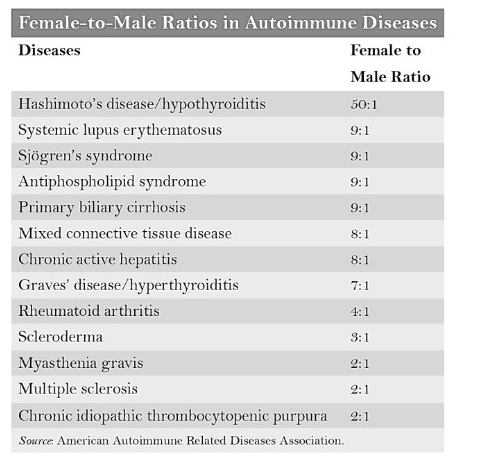 Autoimmune diseases are those where the body, for whatever reason, starts fighting its own cells with an immune response in the same way it would if the cells were a foreign invader (bacteria, virus etc). Women are more likely to get a whole host of autoimmune diseases than men are (see table to the left), including multiple sclerosis, rheumatoid arthritis, and lupus. Apparently, out of all the people suffering from auto-immune diseases in the US, 80% are female. That’s a phenomenal bias for a condition that, on the surface at least, has no clear tie to gender. According to the research (great review here), our increased risk of getting these diseases is simply our great immune systems working against us. Apparently, our immune systems are so great that we’re less prone to infection and have a much greater antibody response to those little invaders that do get in. Unfortunately, our systems are so strong that they also tend to go into overdrive, leading to this attack of our own bodies.
Autoimmune diseases are those where the body, for whatever reason, starts fighting its own cells with an immune response in the same way it would if the cells were a foreign invader (bacteria, virus etc). Women are more likely to get a whole host of autoimmune diseases than men are (see table to the left), including multiple sclerosis, rheumatoid arthritis, and lupus. Apparently, out of all the people suffering from auto-immune diseases in the US, 80% are female. That’s a phenomenal bias for a condition that, on the surface at least, has no clear tie to gender. According to the research (great review here), our increased risk of getting these diseases is simply our great immune systems working against us. Apparently, our immune systems are so great that we’re less prone to infection and have a much greater antibody response to those little invaders that do get in. Unfortunately, our systems are so strong that they also tend to go into overdrive, leading to this attack of our own bodies.
The culprits (or overachieving heroes, depending on how you look at it), are likely exactly what you’d expect: hormones or chromosomal influences. The hormone research actually shows that during pregnancy, women's immune systems switch to a far less aggressive regimen, likely to avoid attacking the fetus as an invader. This decreased immunity is the reason for the increased risk of pregnant women getting the flu, but it’s also the reason that many pregnant women notice a decrease in their symptoms of autoimmune disorders. It’s amazing to think that both the bad and the good stem from the same source: an incredibly strong immune system.

